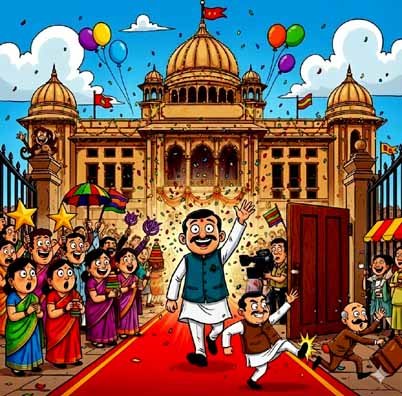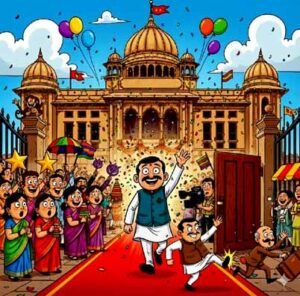
बंगला मोह क्यूँ हो जाता है…?
वॉलीवूड में एक गाना था ” बंगले के पीछे तेरी बेरी के नीचे हाय रे कुर्सी… अहा रे अहा…. शायद ऐसा ही प्रेम सत्तानशीनों को भी हो जाता है. देश- प्रदेश में चुनाव के बाद ऐसी तस्वीर और कहानी ना हो तो स्वाद ही बिगड़ जाता है. एक सवाल है… आखिर मंत्रियों को बंगला मोह क्यूँ हो जाता है…?
सत्ता का घर हमेशा दीवारों से बड़ा होता है. वह स्मृतियों, सुरक्षा और वैभव का मिश्रण बन जाता है. वैसे भी चुनाव के बाद सत्ता का भूगोल बदलता है, और उसी के साथ बदलता है पतों का महत्व. मंत्रियों का बंगला मोह केवल एक आरामदेह घर का लालच नहीं है, बल्कि यह भारतीय राजनीतिक संस्कृति में गहराई से निहित है. यह उन्हें शक्ति, सुरक्षा, सुविधा, और प्रतिष्ठा का एक ऐसा पैकेज प्रदान करता है, जिसे त्यागना उनके लिए आसान नहीं होता है. यह मोह अक्सर वीवीआईपी कल्चर को बनाए रखने की उनकी इच्छा को भी दर्शाता है, जहां पद से हटने के बाद भी वे विशिष्ट बने रहना चाहते हैं, भले ही इसके लिए सरकारी नियमों का उल्लंघन क्यों न करना पड़े.
नई सरकार के गठन के बाद मंत्रियों के लिए नए बंगले आवंटित किए जाते हैं. यह प्रक्रिया खुद दिखाती है कि ‘बंगला’ पद की कार्य-स्थलीय पहचान भी है और राजनीतिक उपस्थिति का संकेत भी. मंत्री जब शासन-व्यवस्था के केंद्र में आते हैं, तो सरकारी बंगला केवल ठिकाना नहीं रहता; वह प्रतिष्ठा, नेटवर्क और प्रतीकवाद का जटिल संसार बन जाता है. यह मोह सिर्फ उनकी निजी इच्छा नहीं, बल्कि सत्ता-संस्कृति का साझा अनुभव भी होता है.
राजनीति में मंत्री का निवास स्थान उनकी वर्तमान हैसियत का सबसे बड़ा संकेतक होता है. एक बड़ा और पॉश सरकारी बंगला कार्यकर्ताओं के बीच यह संदेश देता है कि मंत्री का दबदबा बरकरार है. पद खोने या बंगला खाली करने का मतलब है कि वे अब उतने प्रभावशाली नहीं रहे, जिससे उनके राजनीतिक भविष्य पर असर पड़ सकता है. केंद्रीय स्थानों पर स्थित ये बंगले, कार्यकर्ताओं और आम जनता के लिए आवागमन और संपर्क को सुगम बनाते हैं. यह सुगमता मंत्री को लोगों से जोड़े रखती है, जो उनके वोट बैंक के लिए महत्वपूर्ण होता है.
सुरक्षा एक महत्वपूर्ण मुद्दा है, और सरकारी बंगले एक अभेद्य सुरक्षा कवच प्रदान करते हैं. मंत्री पद के साथ मिलने वाली सुरक्षा और पुलिस गार्ड की तैनाती बंगले के साथ जुड़ी होती है. पद छूटने पर यह सुरक्षा कम हो जाती है. बंगले में रहने से मंत्री और उनका परिवार असुरक्षित महसूस नहीं करते. चूकिं, बंगले का विशाल परिसर, नौकरों के क्वार्टर, और सरकारी सेवाओं की निरंतर उपलब्धता मंत्री को VVIP का दर्जा बनाए रखने में मदद करती है, जिसकी आदत उन्हें लग जाती है.
पॉश इलाकों में एक बड़ा बंगला किराए पर लेना अत्यधिक महंगा होता है. वहीँ, सरकारी बंगले में रहना, उनके वित्तीय बोझ से भी बचाता है. केंद्र की तरह ही, राज्य में भी सरकारी आवास के साथ बिजली, पानी और रखरखाव जैसी मुफ्त सुविधाएं मिलती हैं, जो पद हटने पर एक बड़ा खर्च बन जाती हैं. बताते चलें कि, सत्ता का केंद्र अक्सर मंत्री का आधिकारिक आवास ही होता है, न कि केवल उनका दफ्तर. सरकारी बंगले विशाल लॉन और बड़े कमरे प्रदान करते हैं, जो राजनीतिक बैठकों, प्रेस कॉन्फ्रेंस और बड़ी संख्या में समर्थकों से मिलने के लिए आदर्श होते हैं. चुनाव के बाद भी, भले ही मंत्री पद से हट गए हों, वे राजनीतिक रूप से सक्रिय रहते हैं. बंगले का परिसर उन्हें अपने राजनीतिक कार्य जारी रखने की भी सुविधा देता है.
चुनाव के बाद, पद खोने वाले मंत्री अक्सर यह उम्मीद करते हैं कि अगली सरकार में उन्हें फिर से कोई पद मिल जाएगा या वे अगले चुनाव में जीतकर वापस आ जाएंगे, इस राजनीतिक आशा के कारण वे जानबूझकर बंगला खाली करने में देरी करते हैं, ताकि यदि उन्हें जल्दी ही कोई नया पद मिलता है, तो उन्हें दोबारा शिफ्ट होने की परेशानी न हो. कई बार नियमों का उल्लंघन करते हुए अवैध रूप से कब्जा बनाए रखने की कोशिश की जाती है, जैसा कि अक्सर देखा जाता है कि चुनाव परिणामों के महीनों बाद भी कुछ पूर्व मंत्री आवास खाली नहीं करते.
चुनाव के बाद मंत्रियों का ‘बंगला मोह’ केवल एक शानदार घर में रहने की व्यक्तिगत इच्छा नहीं है, बल्कि यह गहरी जड़ें जमा चुकी सामंती और शक्ति-केंद्रित राजनीति का एक प्रतिबिंब है. बंगला उनके सामाजिक और राजनीतिक अस्तित्व का भौतिक प्रमाण होता है. चुनाव परिणाम इस शक्ति को छीन लेते हैं, और बंगले का खाली होना इस शक्ति के हस्तांतरण की अंतिम और सबसे दृश्यमान मुहर होती है. यही कारण है कि नेता सरकारी आवास को इतनी आसानी से नहीं छोड़ पाते और बंगला मोह अक्सर एक राष्ट्रीय बहस का विषय बन जाता है.
संजय कुमार सिंह.
(पोलिटिकल, सहायक एडिटर) ,
ज्ञानसागरटाइम्स.
========== ========= ===========
Why do we get attracted to bungalows…?

There was a song in Bollywood, “Behind the bungalow, there is your berry ke neeche haye re kursi… aha re aha…” Perhaps even those in power fall in love like this. If there is no such picture and story after the elections in the country or state, then the taste gets spoiled. I have a question… why do ministers become so attached to their bungalows…?
The house of power is always bigger than its walls. It becomes a blend of memories, security, and opulence. After elections, the geography of power changes, and with it, so does the significance of addresses. Ministers’ bungalow obsession isn’t merely the lure of a comfortable home; it’s deeply rooted in Indian political culture. It offers them a package of power, security, convenience, and prestige that they find difficult to relinquish. This obsession often reflects their desire to maintain a VVIP culture, where they seek to remain privileged even after leaving office, even if it means violating government rules.
New bungalows are allotted to ministers after the formation of a new government. This process This itself demonstrates that the “bungalow” is both a workplace identity and a symbol of political presence. When ministers come to the center of governance, the government bungalow is more than just a residence; it becomes a complex world of prestige, networks, and symbolism. This attachment is not merely a personal desire, but also a shared experience of the culture of power.
In politics, a minister’s residence is the most significant indicator of their current status. A large and posh government bungalow sends a message to workers that the minister’s influence remains intact. Losing their position or vacating the bungalow means they are no longer as influential, which could impact their political future. These centrally located bungalows facilitate movement and communication for workers and the general public. This accessibility keeps the minister connected to the people, which is crucial for their vote bank.
Security is a crucial issue, and government bungalows provide an impenetrable security shield. The security and police guards associated with the ministerial position are attached to the bungalow. This security diminishes upon leaving the position. This increases the minister’s influence. Living in a bungalow does not make the minister and his family feel insecure. The bungalow’s sprawling compound, servant quarters, and constant access to government services help the minister maintain the VVIP status they become accustomed to.
Renting a large bungalow in a posh area is prohibitively expensive. Living in a government bungalow also reduces financial burdens. As at the central government, government accommodation in the state also comes with free utilities like electricity, water, and maintenance, which become a significant expense upon leaving office. It’s worth noting that the center of power is often the minister’s official residence, not just their office. Government bungalows offer spacious lawns and large rooms, ideal for political meetings, press conferences, and meetings with large numbers of supporters. Even after elections, even if ministers have stepped down, they remain politically active. The bungalow compound also allows them to continue their political work.
After elections, ministers who lose office often hope to be reinstated in the next government. Political hopes that they will be rehired or returned after winning the next election lead them to deliberately delay vacating the bungalow, avoiding the hassle of relocating if they soon secure a new position. Sometimes, attempts are made to illegally maintain occupancy by violating rules, as is often seen when some former ministers do not vacate their residences even months after the election results.
The “bungalow obsession” of ministers after elections is not merely a personal desire to live in a luxurious home, but a reflection of deeply ingrained feudal and power-centric politics. The bungalow is the physical proof of their social and political existence. Election results take away this power, and the bungalow’s vacancy is the final and most visible seal of this transfer of power. This is why leaders are unable to relinquish government accommodation so easily, and the bungalow obsession often becomes a topic of national debate.
Sanjay Kumar Singh.
(Political, Assistant Editor),
Gyansagartimes.





